The week that I started the great London remote working challenge
Also the week that I went to the Highgate Cemetery - 17 years too late.

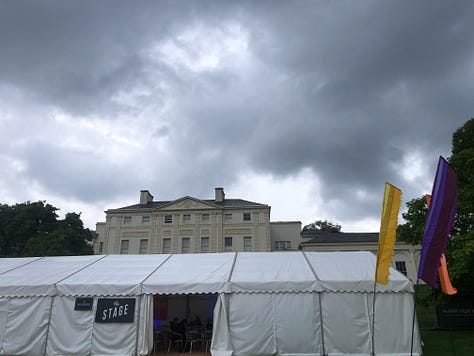

In the much competitive London and UK festival space, there’s limited space for opposing viewpoints. So it was great to see independent journalist Matt Kennard in discussion with activist, writer, journalist, historian and filmmaker Tariq Ali at the HowTheLightGetsIn festival on Hampstead Heath last Sunday.
This was my first time going to it and I was lucky that the New Humanist, which I wrote for last year, offered a discount so it was well worth the ticket price. Would recommend for any one thinking about going next year.
It took place at the charming Kenwood House and was one of the highlights in another busy week. It was dark weather, as you can see from the photos, but with the mess taking place in the world at the moment and some of the discussions it kind of suited it.
In the first session that I went to, “Lifting the Lid on the Economic Elite”, Ali acknowledged that much of the same voices from the BBC were on the programme.
“You can do that it’s your right to do so but why bother calling it philosophy?” he asked a packed out audience. Looking around I felt like I saw a few famous figures, some who were nodding, but I couldn’t put a name to them.
During the session with Kennard, an independent journalists and one of my faves after his coverage of the Assange case, Ali said that young people don’t bother with the news - nor does he. “I read (the papers) to find how appalling they are,” he said, claiming that there was very little investigative journalism being conducted.
He earned the most claps and laughs when he recalled being questioned in an interview whether the pro-Palestine protests that now take place in central London every week and attract 100k people were “hate marches” as former UK home secretary Suella Braverman labelled them.
Ali said: “I said these are hate marches, we all hate her.”
Kennard added that while the Vietnam War wasn’t live-streamed, the genocide in Gaza is, - and it’s undeniable that this is happening now. “Israel couldn’t operate for a week without the US,” he said. “I couldn’t read newspapers now.”
But the empire and media were now more exposed than ever, said Kennard. He echoed Ali’s sentiments that young people were turning away from the media. “The door is kind of ajar, so we need to kick it in.”
He argued that the genocide in Gaza was a UK and US one. The press didn’t outright lie but engaged in “propaganda by omission”. Kennard said: “Mainstream media is dying, it’s a good thing. We don’t need to save it, we need to say goodbye to it.”
The US had also been doing its level best to stop former Labour leader Jeremy Corbyn from getting ahead, which hadn’t been reported in the media, Kennard said.
This was the second panel that Ali appeared on. The other one was alongside the head of Global Magnitsky Justice campaigner Bill Browder, former Thatcher and Major Cabinet minister Malcolm Rifkind and critical legal theorist, historian and journalist Camila Vegara on “A Precarious Peace.”
“Oh I like him,” an older woman wearing a blue hat with orange nails said to me referring to Browder as she sat down next to me. One of the things that he stressed was that as his political ally against Putin, Russian chess grandmaster Gary Kasparov says “We should fight them in the banks instead of with tanks.”
The other festival discussions that I attended looked at whether you need a goal in life, how medical diagnoses are going wrong, and on beauty (this included Sarah Wilson as a panellist).
But the most entertaining one was actually from former UK Parliamentary Speaker John Bercow, who spoke very candidly about his political journey, whether I agree with him or not. I actually think that he’s one of the best public speakers that I’ve ever seen and if I needed to do public speaking and had money I’d hire him. It might have taken about 12 minutes for him to introduce himself after he even managed to make a joke out of asking an audience member if she could hear him, but it was witty and it wasn’t just me who thought this. On the way out I overheard someone else say that it was a great oratory performance.
Elected four times and standing with five prime ministers, Bercow told us that finally did “wean myself off the Conservative drug” after what he said was a lengthy period of downgrading and ruination of public services. In 2021, he defected to Labour. The shift came about after he got married, had kids and reflected on the ever-growing gap between the haves and have nots. (This makes me think of someone like our own Holly Valance, who has gone the other way).
Bercow also gave a brief rundown of his feelings on previous PMs, describing David Cameron as “dexterous, fleet of foot” and “not a great prime minister”. He compared Theresa May to a coffee table because she was so “wooden”. But his harshest criticism was for Boris Johnson who he said was “by a country mile” the “worst prime minister of my lifetime and yours”. Oh and he did a great impersonation of him, too.
Bercow said that a “war on poverty” should be the “defining essence” of the current government. He said that it should “make ministers sweat when they get up in the morning”.
He labelled Reform a threat unless Labour came through on the goods, although stressed “I’m not saying Farage is racist”. (This annoyed me). And he said that Donald Trump had to be stopped from becoming US leader again.
“One of these days I will learn to tell you what I really think,” Bercow joked at the end of his session. He told an audience member who asked his thoughts that while he was in favour of proportional representation, he didn’t think that the UK would adopt this any time soon.
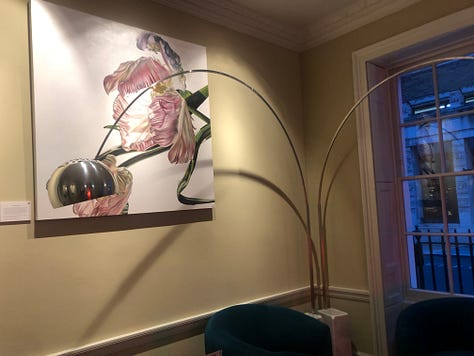
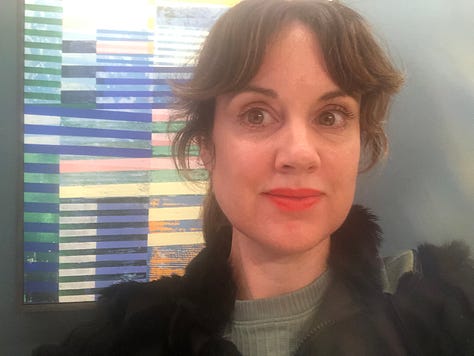

Last week I did so much again. But I know that there will be a day soon when I’m sitting at home - not doing a lot.
After becoming so impatient with London the past few weeks, I think last week was a week that I really started to like it again after realising that there’s a plethora of choice here for everything. Even just the options for remote working are endless.
On Tuesday, I worked from the Royal Society of Arts, Manufactures and Commerce (RSA) after a friend took me there. It has to be the city’s best kept remote working secret! On Wednesday I went to the British Library and then on Thursday the Wellcome Collection and now I’ve decided to write a guide to remote working in London on here.
Finally, on Friday I got around to seeing the Highgate Cemetery - 17 years too late. This came about after I saw a LinkedIn post a few weeks ago by someone I follow highlighting (or should I say poking fun of) Jeremy Corbyn once taking Diana Abbott there on a date to see Karl Marx’s grave. This is mentioned in Abbott’s memoir, which was recently serialised in The Guardian and then picked up by many other titles:
It reminded me that in my first year of London nearly two decades ago, someone (I can't remember who but thank you if you're reading this) recommended going to have a look at the cemetery.
What was also funny was that my Canadian cousin was in town and when she asked me if I wanted to meet up with her on Thursday I said “yes, but after I get back from the Highgate Cemetery”. Did she think that someone had died?
A cast of thousands had the same idea as me! Or maybe not. In fact no one on the bus or at the Tube station or even the tour guide, who told me "I'll have to update the notes", had any idea about Corbyn and Abbott’s date night. Why is yours truly not doing PR for the Haringey Council?
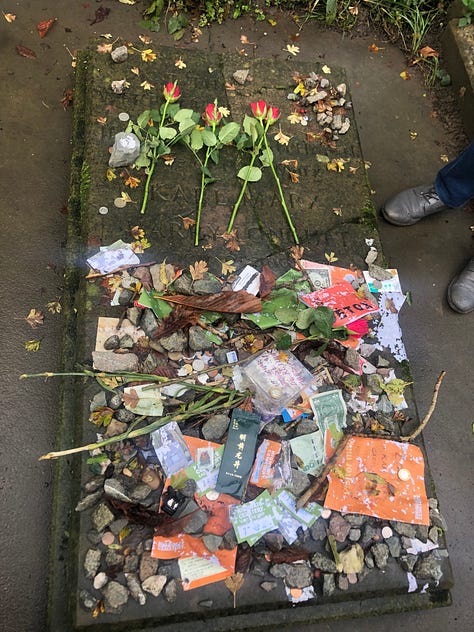
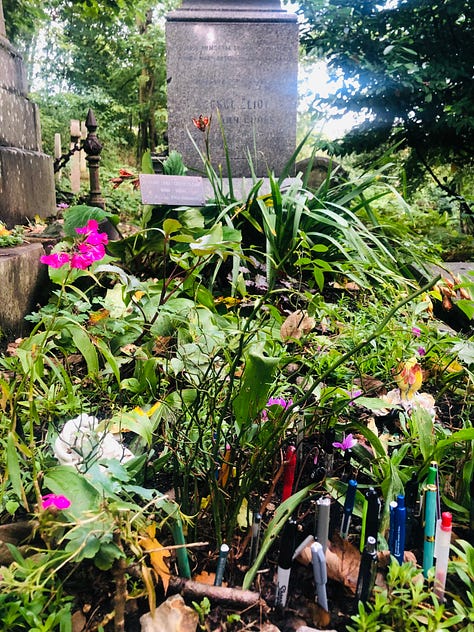

In all seriousness though, it was a fascinating tour which also took in the grave of George Eliot - fans have stuck pens, biros and markers in the grass in front of her plot - and the brains behind the Great Train Robbery, Bruce Reynolds, among others. This reminds me to look for my copy of Middlemarch, which I studied in the first year of my English Literature degree at Sydney University, when I’m next at home in Australia.
I also just loved walking around amongst the birds, squirrels and leaves looking at what had been chosen for the epitaphs of the non-famous at the cemetery. More on this later.
Yes, I did see my cousin and we went to Granary Square Brasserie in Kings Cross for dinner, which I’d really recommend.
Speaking of leaves, autumn is definitely here if the shop windows are anything to go by. I spotted this on a trip to Whistable yesterday. It reminds me that this time last year I was getting ready to go to Vancouver, one of the homes of the original Starbucks pumpkin spice latte, which I soon discovered was now a million dollar trend extended to breakfast cereal and pasta sauce which I unbelievably spent so much time thinking about. This year it’s been brought back earlier than ever…

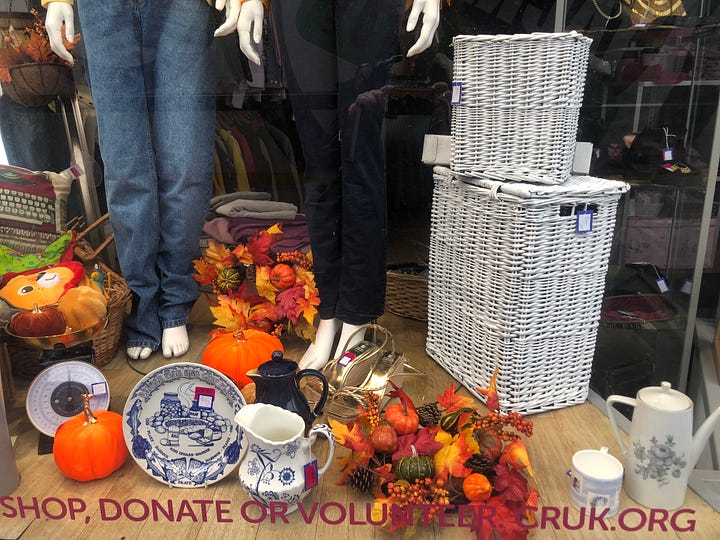
Something that I really liked this week was this piece by Yassmin Abdel-Magied, a Sudanese-born writer, author, broadcaster and award-winning social advocate, for Hyphen. (I’m currently working on a story for them!) It’s titled “No matter how it looks from the outside, one’s professional life is as fragile as a house of cards”.
In it, she talks about having to do higher paying work to support her more creative work, something that I alluded to on here when I talked about “work shame” a couple of weeks ago:
That’s it. This week is already busy. I just watched the livestream of Julian Assange speaking at the Council of Europe in Strasbourg in his first public appearance since being released and this week am going to the Palestine protest in town as the anniversary of October 7 looms.




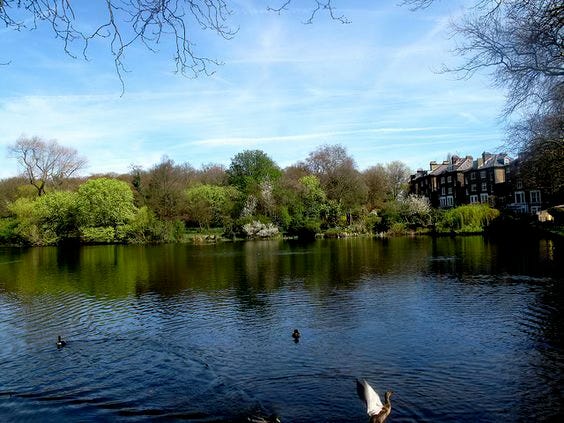
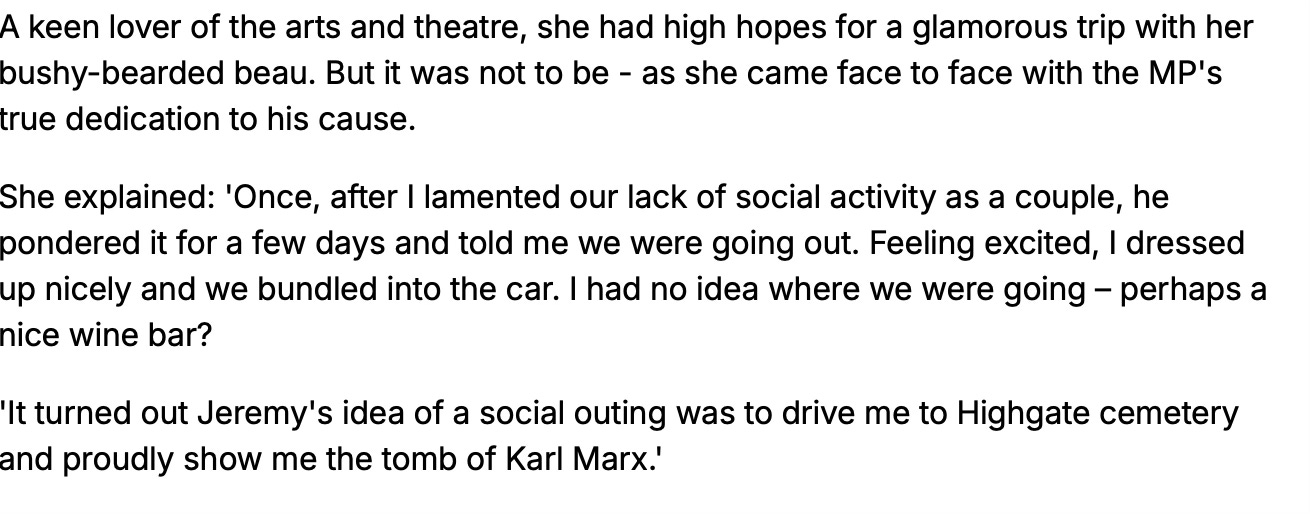

Gaza is yet another Vietnam or Korean War tragedy in which "political correctness" tragically gets in the way of peace. The way to avoid war is to stop or better deter the invasions that trigger it. Unfortunately, there's a whole industry of conventional weapons plus a whole industry of war reporters, dedicated to ensuring their pay cheques continue...